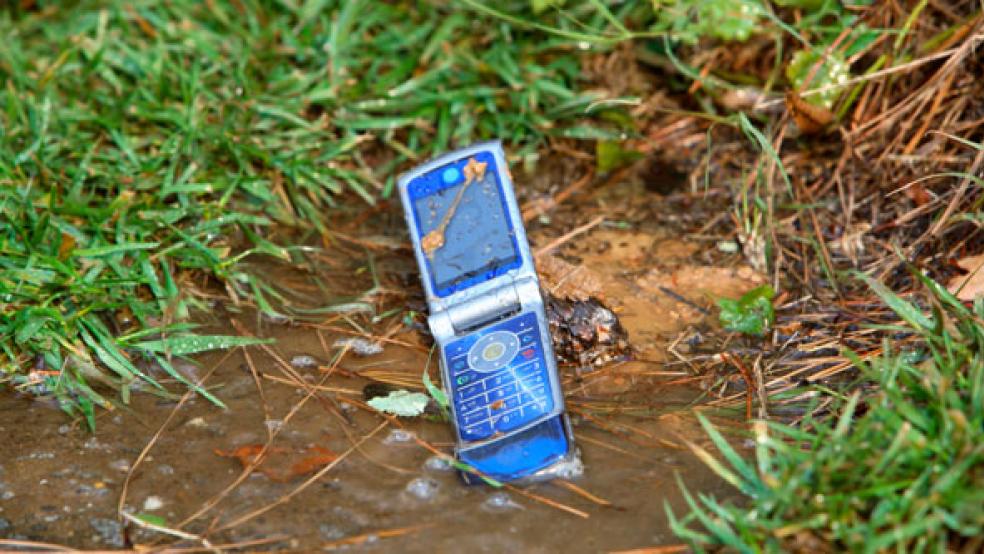Over the past four years, Chelsey Lutz, 25, a blogger in NYC, has lost her iPhone seven times. "I usually leave it in cabs," she says. Somehow, the phone always finds its way back.
Lady Luck has been on Lutz's side. For many others who are less fortunate, lost phones not only mean a loss of money and banking or personal credential items, which will need replacing, but a risk that private photos and financial and banking details may be pried (or hacked) into. And there are plenty of those falling into the less lucky group.
Lookout Inc., which makes the Lookout mobile phone-recovery application for Androids and iPhones, found that nine million of its more than 15 million users lost their mobile phones in 2011. These were lost most frequently between 9:00 pm and 2:00 am, in coffee shops, bars, restaurants and offices, Lookout said.
RELATED: The iPhone Economy: A Pocket Full of Miracles
Among just the company's app users, lost phones were valued at an average of about $7 million a day. Lookout extrapolated that figure to all U.S. mobile phone users for a potential replacement cost of $30 billion a year if those phones weren't recovered. Many of those phones, of course, do get returned or turn up, said Lookout, which is studying recovery rates.
"If you're out and around, there's just a higher likelihood of misplacing your phone," says Ayan Mandal, director of products at Lookout, adding that the sheer volume of people losing their phones was striking. Loss reports jump, for example, following festivals, sporting events and other large gatherings, Mandal says.
To glean some insight into the fate of lost phones, the data security company Symantec Corp planted 50 "lost" phones, 10 each in New York, Washington, D.C., Los Angeles, San Francisco and Ottawa, and learned that seven out of 10 people who found them attempted to access stored photos, more than half tried to read a spreadsheet call "HR Salaries," and 43 percent tried to use an online banking app. "Clearly that's not someone trying to find out who the owner of the phone is," says John Engels, principal product manager with Symantec's enterprise mobility group.
Preventive Steps
The first precaution any smartphone user should take to protect their information against phone theft or loss is to set a password for the home screen, says Alicia diVittorio, consumer safety advocate for Lookout.
Symantec's Engels and other phone safety experts agree that taking that simple step will prevent someone from being able to access everything stored on the phone. "This (a smartphone) is closer to a computer than a traditional phone," Engels says. "It has much more rich information on it." And to prevent phone loss in the first place, Lookout's diVittorio suggests a quick check before leaving whatever venue you may visit. "If you're in a crowd, check your pocket a second or third time," she says.
Owners can also increase the chances of getting their lost phone back by putting a contact phone number or email address on the background screen, or by affixing a business card to the rear, Engels says. Symantec's experiment found that about half the phones they planted were returned, and contact information to return the phones was easily found, Engels says.
RELATED: Why Cell Phone Makers Can't Find Batteries That Last
While counting on the goodwill of strangers is risky, there is no shortage of stories about random people helping reunite owners and their missing phones. Robin Canfield, 26, who works for Diamond Public Relations in Miami, was on a plane back to Florida from Atlanta when she realized her phone had been left in an airport bathroom. "I raced to the front and the kind stewardess offered her cellphone so I could call mine and see if anyone would pick up," Canfield says. A Delta Air Lines customer service agent answered and arranged to have the phone sent overnight to her.
There are also apps, such as Find My iPhone, designed to help users locate phones already lost, or to send alerts, many of which have free versions. Lookout, for instance, allows those who have lost Android or iPhones, to use GPS features to track them. You can actually watch the phone moving, if it's in a cab, for instance, diVittorio says. A slightly more desperate measure, if chances of an honest return seem slim, is to remotely erase the contents of the phone.
Lutz, who writes the YourStyleSavior.com blog, has mostly counted on the goodwill of strangers - like cab drivers, and pizza parlor and store owners - to return her phone after ringing the wayward device. But realizing during the most recent disappearance that her phone was set to "silent," she says she tried the "Find My iPhone” app available through Apple Inc.'s iCloud. It sent a signal to the phone and put up a contact phone number she typed in. Soon after, she got a call from the person who had the phone.
"I always manage to get it back," Lutz says, adding, "I fear my luck is running out."
(The writer is a Reuters contributor. The opinions expressed are his own.)




